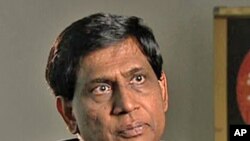While the United States releases its report on human-rights violations in other countries, some international rights advocates say the U.S. needs to improve its own record.
The new State Department Human Rights Report details rights violations around the world. In Iran, for example, the report notes examples of people being arrested without charge and tortured while in custody.
But some human-rights advocates accuse the United States of similar abuses on suspects detained in the war on terror.
Amnesty International Advocacy Director T. Kumar says the mistreatment of detainees held at Guantanamo Bay, Cuba could open the door to greater abuses.
"The minute [the] U.S. is comfortable doing it to non-us citizens, water-boarding or other types of torture, or keeping them in detention without trial for a long, long time, it is almost seven, eight years now, and trials also [are] not fair, it will not take long before they apply it to their own citizens," said Kumar.
The administration of U.S. President Barack Obama announced plans last year to investigate accusations that intelligence agents were using these aggressive interrogation techniques under former president George W. Bush.
Former Vice President Dick Cheney has been a staunch defender of the Bush administration's intelligence policies. In August, on the television program Fox News Sunday, Cheney said the interrogation tactics were an essential tool in the war on terror:
"Those interrogations were involved in the arrest of nearly all the al-Qaida members that we were able to bring to justice," he said. "I think they were directly responsible for the fact that for eight years, we had no further mass casualty attacks against the United States."
Another point of concern for Amnesty International is America's use of the death penalty. Kumar says the United States is the only Western country that still executes people.
"No one should be allowed to take life of another human being - that is the foundation of why we oppose death penalty," he said. "Even the people who are horrible people, mass rapists, mass killers, we still stand by them saying no one has right to take life from [an] individual."
But Michael Paranzino of the pro-death penalty group Throw Away the Key says executing murderers is about providing closure for the families of victims.
"That is where I think this debate has to be focused, the lasting harm to entire families when people are murdered," said Paranzino.
Amnesty is also critical of the state of health care in the United States. Kumar says health care is one of the basic rights available in other countries that should be available to all Americans.
"I will say U.S. is not up to par with other Western nations, but when you compare U.S. to other countries, like China, obviously the U.S. is far ahead," he said.
Congress has been debating health-care reform for months. While few would argue the need for basic health care, many conservative lawmakers argue recent proposals would cost too much.
This is Republican Senator Lamar Alexander at a recent health-care summit.
"Our country is too big, too complicated, too decentralized for Washington, a few of us here to just write a few rules about remaking 17 percent of the economy all at once," he said.
While the United States is not reviewed in the State Department's annual country report, its domestic-rights situation will come under scrutiny this fall at the United Nations Human Rights Council.
US Accused of Human Rights Violations
- By Gabe Joselow




